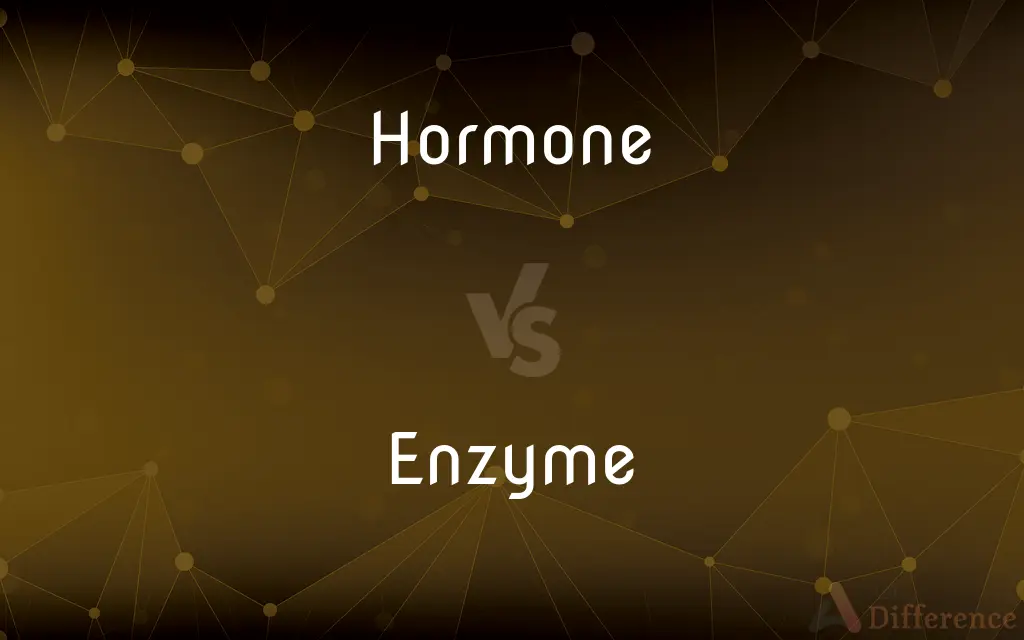Hormone vs. Enzyme — What's the Difference?

Difference Between Hormone and Enzyme
ADVERTISEMENT
Compare with Definitions
Hormone
A hormone (from the Greek participle ὁρμῶν, "setting in motion") is any member of a class of signaling molecules in multicellular organisms, that are transported to distant organs to regulate physiology and behavior. Hormones are required for the correct development of animals, plants and fungi.
Enzyme
Enzymes () are proteins that act as biological catalysts (biocatalysts). Catalysts accelerate chemical reactions.
Hormone
A substance, usually a peptide or steroid, produced by one tissue and conveyed by the bloodstream to another to effect physiological activity, such as growth or metabolism.
Enzyme
Any of numerous compounds that are produced by living organisms and function as biochemical catalysts. Some enzymes are simple proteins, and others consist of a protein linked to one or more nonprotein groups.
Hormone
A synthetic compound that acts like a hormone in the body.
ADVERTISEMENT
Enzyme
(biochemistry) A globular protein that catalyses a biological chemical reaction.
Hormone
Any of various similar substances found in plants and insects that regulate development.
Enzyme
(Christianity) leavened bread, as opposed to azyme
Hormone
(physiology) Any substance produced by one tissue and conveyed by the bloodstream to another to effect physiological activity.
Enzyme
A protein produced by a living organism, capable of catalyzing a chemical reaction. Almost all processes in living organisms require some form of enzyme to cause the reactions to occur at a rate sufficient to support life. There are a very wide variety of enzymes, each specifically catalyzing a different chemical reaction, the sum of which cause the bulk of the physiological changes observed as life processes. Enzymes, like most proteins, are synthesized by the protein-synthetic mechanism of the living cell, at special sites on ribosomes, using the genetic information in messenger RNA transcribed from the genetic instructions stored as nuleotide sequences in the DNA (or in some viruses, the RNA) of the genome. Some examples of enzymes are: pepsin, diastase, rennet, DNA polymerase, invertase, glucose oxidase, protease, and ribonuclease. There are many other types of enzyme.
Hormone
(pharmacology) A synthetic compound with the same activity.
Enzyme
Any of several complex proteins that are produced by cells and act as catalysts in specific biochemical reactions
Hormone
Sex hormones, as used in hormone replacement therapy for transgender or intersex people.
I'm going to be going to slightly higher doses of hormones soon.
Hormone
(botany) Any similar substance in plants.
Hormone
To treat with hormones.
Hormone
A chemical substance formed in one organ and carried in the circulation to another organ on which it exerts a specific effect on cells at a distance from the producing cells; thus, pituitary hormones produced in the brain may have effects on cells in distant parts of the body..
Hormone
A chemical substance, whether natural or synthetic, that functions like a hormone in a living organism. Thus, synthetic steroid hormones may be more effective than their natural counterparts.
Hormone
A substance that controls growth rate or differentiation in plants; also called phytohormone. The most well-known are the auxins that stimulate growth at the growing tips of plants, and control root formation and the dropping of leaves; and the gibberellins, which are used in agriculture to promote plant growth.
Hormone
The secretion of an endocrine gland that is transmitted by the blood to the tissue on which it has a specific effect
Share Your Discovery

Previous Comparison
Condition vs. Stipulation
Next Comparison
Monolingual vs. Quadrilingual














































